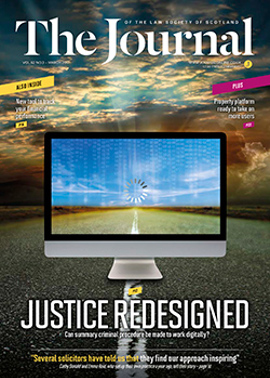Law without frontiers

Where do you come from, and why choose to study law?
I grew up on a farm in Aberdeenshire and was pretty keen to see the bright lights, so chose to do my law degree at the University of Glasgow. Even though I wasn’t entirely sure that I wanted to be a lawyer, the vocational aspect of the degree really appealed to me.
Can you describe your career path to your current position?
After completing my LLB, I worked briefly as a research assistant to an author for a book on European criminal law. Then I interned at the International Criminal Tribunal for the former Yugoslavia (ICTY) on the Milosevic case (January to June 2006) for the judges, one of whom was Lord Bonomy. That really whetted my appetite for public international law, so I went straight into studying for an LLM in International Law at the University of Liverpool.
While there, I was accepted to do a PhD in the field of international humanitarian law, but after my prospective supervisor left for a job in the Ministry of Defence, it settled my “academia or practice” dilemma and I went off to the University of Edinburgh to get my Diploma in Legal Practice. I did the two-year Crown Office traineeship before embarking on four years in practice as a criminal defence solicitor in a small firm in Kilmarnock. I spent my last year there as a partner. I felt that the time was right for a change and saw a job advertised at the UN-ICTY that sounded right for me.
Describe your role at the UN. Do you do any trial or court advocacy?
I work for the Office of the Prosecutor of the United Nations Mechanism for International Criminal Tribunals (UN-MICT) and I’m part of a trial team. Our trial is due to start in the first quarter of 2017, so we’re currently involved in a busy pre-trial phase that involves written litigation and taking witness statements (all over the world!), among many other tasks. We have status conferences in court every few months, and once the trial starts, my role will involve a lot of trial and court advocacy.
How is your legal team structured?
The Office of the Prosecutor, which has an appeals division as well as a trial division, works under a prosecutor, currently Serge Brammertz. Our individual trial team is headed by a senior trial attorney, who manages a team of lawyers, analysts and trial support staff.
What kind of cases have you worked on and are working on now?
I was part of the prosecution appeals team that is working on the Radovan Karadzic appeal (both the defence and the prosecution have appealed aspects of the trial judgment). Now I’m working on the prosecution of the former head of the Serbian State Security Service and one of its senior employees.
Does your work involve travel to investigate cases?
Yes, I’ve been to Croatia twice since the summer and will be travelling again early in the new year to interview another witness.
What are the challenges of working in an international, multicultural environment?
There are more benefits than challenges, but adjusting my litigation style has been one challenge. There is a far greater focus on written litigation here, so my ability to produce persuasive written pleadings has been greatly enhanced. The criminal procedure here incorporates elements of civil procedure, which was initially quite alien to me, but you soon adapt.
Have you any advice for law students who want to get into international law?
Studying public international law in your first or second year will open up your honours choices – I did honours in international criminal law and PIL was a prerequisite for this course. I also did a study-abroad Erasmus exchange in my third year, which really opened my eyes to living and working in an international environment. Although the UN’s internships are unpaid and usually require you to be at least in your final year of undergraduate studies, if you can secure some funding it is a really worthwhile experience. Of course, there are also funded internships at other international institutions, so look around!
Do you need to speak a second language to work at the UN? To what standard? What is your second language and do you work in it regularly?
The official languages of the Tribunal are French and English. I only have a basic understanding of French and do not use it at the UN. A lot of my colleagues speak two, three or more languages, so while it’s not required, it is certainly an asset and can help you get a post here.
What is a typical working day or week like?
Very busy and very varied! Today, I was in work about 9am and had a meeting with chambers and the defence teams at 10am. We’ll be in court today from 3.30pm until 5.30pm to litigate a specific pre-trial issue and, in the meantime, we’re working on various other pre-trial motions and responses. I’m also in the middle of preparatory witness work, in order to prepare for January’s mission to take a witness statement from the founder of a human rights organisation that was active during the Balkans conflict.
What motivates you to go to work?
The subject matter of my work is fascinating. Our case spans the conflicts in Croatia and Bosnia and the indictment spans four and a half years. Although I loved practising criminal law domestically, none of my cases were of this magnitude (in terms of evidence and witnesses) or had the same historical and political context or significance. Although the war in the Balkans ended around 20 years ago, when you meet victims and witnesses you realise that your work is still very relevant to a lot of people
What is it like living in The Hague? What do you miss about Scotland?
It’s a very international environment, although we’ve bought an apartment out by the beach in a part of the city that used to be a separate fishing village and feels a lot more Dutch than other parts of town. I’ve learned some Dutch, which definitely helps with integration, but English is extremely widely spoken here, which makes it a very easy city to relocate to. Although I miss my family, I really miss Scotland’s landscapes. I only really realised what a beautiful country Scotland is when I came there as a visitor.
Do you see yourself ever working in Scotland again? Perhaps at the bar?
Absolutely. I feel that the skills that I’m acquiring out here would serve me really well if I went to the bar, whether that was for criminal or civil work.
What’s been your funniest/weirdest day as a lawyer?
Criminal defence practice in Kilmarnock provided me with many a strange tale to tell, although I think someone in court referring to the Vernon Mansfield Scheme (drink driving rehabilitation programme) as the Bernard Manning Scheme, definitely counts as a comedy highlight.
Scariest day as a lawyer?
It has to be taking my first trials court as a “baby fiscal”, without a shadow of a doubt. Nothing can prepare you for it!
What do you do for fun?
Fortunately my husband is not a lawyer, so I really do get to switch off when I go home! He works in the music industry, and we both really enjoy going to gigs and festivals. We love cooking and travelling as well. A big advantage of working in The Hague is its proximity to Schiphol airport – weekends away are much more affordable and frequent than they were in Glasgow. Not being on call as a defence lawyer helps with that too!
What would you take with you to a desert island? What would you put in Room 101?
I’d take a radio onto a desert island. Apart from the music, I love the obscure programmes on Radio 4 on a Sunday. What would I put in Room 101? The many dubious political developments of 2016!
In this issue
- Private prosecution: the Glasgow Rape Case revisited
- The commercialisation of space
- Feminism: all is not what it seems…
- Retaking the narrative on complaints
- Reading for pleasure
- Opinion: Alan McIntosh
- Book reviews
- Profile
- President's column
- RoS riding to the four (hundred)
- People on the move
- Scot in the European hot seat
- When partners fall short
- Uber: a great gig?
- Brexit: the end of cross-border practice?
- Closing in: the gender pay gap rules
- Simple procedure – it's complicated
- When changing the defender is OK
- Solemn procedure: beware the changes
- Divorce and the new state pension
- Delivery of alcohol: a “game changer”?
- A tale of two "Budgets"
- Scottish Solicitors' Discipline Tribunal
- "One-shot" rule sees rejection income soar
- Law without frontiers
- CJEU decision supports LPP protections
- Society thank-you for STARTS support
- From the Brussels Office
- Law reform roundup
- Expertise plus: promoting a sector strength
- Paralegal pointers
- What to do about client interest?
- Still free to market?
- New year, new contact
- Ask Ash
- Paying homage to King Cash






